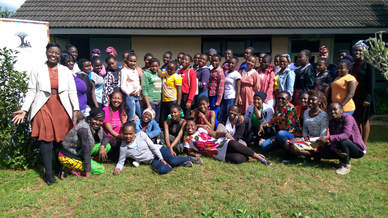
KUZA
KUZA is a Swahili word for Nurture. The program is a two- year girl led mentorship program in which girls aged 12-17 within Mukuru slums participate. Girls are recruited in July into the mentorship program and are mentored on sexual and reproductive health, self-esteem, life skills, crafting, and financial literacy. The main objectives of Kuza include sharing knowledge, igniting aspirations, reducing early marriage, and preventing teenage pregnancies, with a long term goal of economically empowered young women. Mentees within the program are also exposed to the outside world to sharpen their aspirations and desires through career visits and/or exposure visits. The program is implemented by trained U-Tena mentors who have experienced and overcome some of the challenges faced by the girls. Globemed at Brown funds the project, U-Tena implements the program in partnership with community leaders and parents who support their girls to participate in the program. U-Tena has been implementing the Kuza program since 2012. Alum of the program become empowered to make informed decisions regarding their life and sexual behavior which leads to a later sexual debut. As a result the girls have been able to complete their primary and secondary education, instead of having to drop out of school due to unplanned pregnancies. Through preventing early pregnancy these girls are able to avoid further exacerbating the already bad situation of poverty and poor housing.
Since 2012, the KUZA project has been able to reach 185 girls. During the first year of the program the girls meet in small clubs of between 10-20 girls with their mentor and co- mentor and discuss issues surrounding sexual and reproductive health. In the second year, topics such as financial literacy which includes learning a livelihood skill like beadwork, or performing art are part of the curriculum. The mentors use personal experience and their personal stories to motivated to the adolescent girls they mentor. Additionally, the mentors use manuals as a guide and the mentees are given handbooks with similar information. Since the inception of Kuza, 90% of the girls have been able to transit to secondary schools are complete their studies without dropping due to early marriage or teenage pregnancies. This is directly attributed to the mentorship they have received within the years and the support they receive including provision of sanitary pads to ensure they stay in school even during their menstruation days.
KUZA is a Swahili word for Nurture. The program is a two- year girl led mentorship program in which girls aged 12-17 within Mukuru slums participate. Girls are recruited in July into the mentorship program and are mentored on sexual and reproductive health, self-esteem, life skills, crafting, and financial literacy. The main objectives of Kuza include sharing knowledge, igniting aspirations, reducing early marriage, and preventing teenage pregnancies, with a long term goal of economically empowered young women. Mentees within the program are also exposed to the outside world to sharpen their aspirations and desires through career visits and/or exposure visits. The program is implemented by trained U-Tena mentors who have experienced and overcome some of the challenges faced by the girls. Globemed at Brown funds the project, U-Tena implements the program in partnership with community leaders and parents who support their girls to participate in the program. U-Tena has been implementing the Kuza program since 2012. Alum of the program become empowered to make informed decisions regarding their life and sexual behavior which leads to a later sexual debut. As a result the girls have been able to complete their primary and secondary education, instead of having to drop out of school due to unplanned pregnancies. Through preventing early pregnancy these girls are able to avoid further exacerbating the already bad situation of poverty and poor housing.
Since 2012, the KUZA project has been able to reach 185 girls. During the first year of the program the girls meet in small clubs of between 10-20 girls with their mentor and co- mentor and discuss issues surrounding sexual and reproductive health. In the second year, topics such as financial literacy which includes learning a livelihood skill like beadwork, or performing art are part of the curriculum. The mentors use personal experience and their personal stories to motivated to the adolescent girls they mentor. Additionally, the mentors use manuals as a guide and the mentees are given handbooks with similar information. Since the inception of Kuza, 90% of the girls have been able to transit to secondary schools are complete their studies without dropping due to early marriage or teenage pregnancies. This is directly attributed to the mentorship they have received within the years and the support they receive including provision of sanitary pads to ensure they stay in school even during their menstruation days.
KUZA Project Progress
